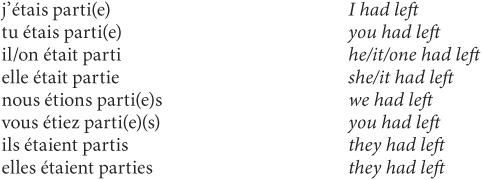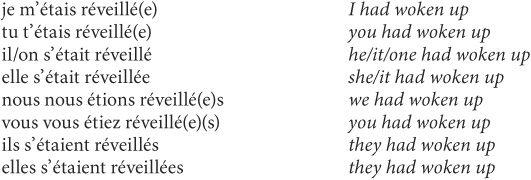
Like the passé composé, the French pluperfect (also called past perfect) is a compound past tense, i.e., it consists of two words: the auxiliary and the past participle. In English, this tense is expressed by had + past participle (had given) or had been … -ing (had been giving). In French as in English, the pluperfect describes what had happened before another action in the past.
In the English sentence “I had studied French before I went to France,” for example, the action of studying occurred prior to going to France and is therefore in the pluperfect. After we review the formation of the pluperfect, we will study its use.
To form the pluperfect, use the imperfect tense of the auxiliary (avoir or être) and add the past participle of the verb in question.
donner to give

partir to leave

se réveiller to wake up

 In the pluperfect the verb takes the same helping verb (auxiliary) as in the passé composé.
In the pluperfect the verb takes the same helping verb (auxiliary) as in the passé composé.
 The pluperfect is formed just like the passé composé, except that the auxiliary is in the imperfect.
The pluperfect is formed just like the passé composé, except that the auxiliary is in the imperfect.
 The agreement of the past participle in the pluperfect follows the same rules as in the passé composé.
The agreement of the past participle in the pluperfect follows the same rules as in the passé composé.
EXERCICE
7•1
Traduisez en français les mots entre parenthèses.
1. (They [masc.] had returned) ______________ la veille.
2. (We had come) ______________ chez eux.
3. (They [fem.] had chosen) ______________ de retourner.
4. (You [pol.] had promised) ______________ de le faire.
5. (I had laughed) ______________ de ses plaisanteries.
6. (We had learned a lot) ______________ à l’école.
7. (They [masc.] had been) ______________ absents.
8. (The proposition [La proposition] had fallen) ______________ à l’eau.
9. (It had rained) ______________ toute la journée.
10. (You [fam.] had written) ______________ un petit mot.
11. (He had wanted) ______________ danser avec elle.
12. (They [masc.] had hurried) ______________.
The uses of the pluperfect in French and English are very similar. There are only two instances where the English past perfect will not be translated into French by the pluperfect but rather by the imperfect.
 In an affirmative statement after depuis, il y avait + time + que, and ça faisait + time + que, the imperfect is used to refer to an action that was going on for a certain time in the past, prior to another action that interrupted it.
In an affirmative statement after depuis, il y avait + time + que, and ça faisait + time + que, the imperfect is used to refer to an action that was going on for a certain time in the past, prior to another action that interrupted it.
He had been working in New York for five months when they offered him a job in Paris.
Il travaillait à New York depuis cinq mois quand on lui a offert un poste à Paris.
 To express the English had just (+ past participle), French uses the verb venir in the imperfect tense + de (+ infinitive).
To express the English had just (+ past participle), French uses the verb venir in the imperfect tense + de (+ infinitive).

A. The pluperfect tense is used to express an action, event, or situation that happened before another past action, event, or situation that may or may not be mentioned in the same sentence.

EXERCICE
7•2
Traduisez en français les phrases suivantes.
1. Robert was looking for the suitcase (that) he had lost. ______________________________________
2. She finally gave me back the money (that) I had loaned (prêter) her a long time ago. ______________________________________
3. He had an accident because he had been drinking. ______________________________________
4. The teacher was disappointed because the students had not done their homework. ______________________________________
5. When they had sold their house, they moved. ______________________________________
6. When Napoléon decided to leave Moscow, the Russian winter had already started. ______________________________________
7. She had lived in Africa before she came (avant de venir) to the United States. ______________________________________
8. They (masc.) thought (that) he had died in the war. ______________________________________
9. She was happy because she had received an award. ______________________________________
10. I did not know where I had put my wallet. ______________________________________
B. The pluperfect is used after si to express a regret about something that can no longer be changed.

EXERCICE
7•3
Traduisez en français les phrases suivantes.
1. If only I had listened to him! ______________________________________
2. If only they (masc.) had not said that! ______________________________________
3. If only he had not driven so fast! ______________________________________
4. If only we had followed his advice! ______________________________________
5. If only you (fam.) had arrived on time! ______________________________________
6. If only you (pol.) had told me (= said it to me) earlier! ______________________________________
C. The pluperfect is used with depuis (ça faisait … que, il y avait… que) in a negative statement for an action that started in the past and continued up to a certain point in the past.
Je ne lui avais pas parlé depuis trois mois quand je l’ai rencontré.
I had not talked to him for three months when I met him.
Or: Ça faisait trois mois que je ne lui avais pas parlé quand je l’ai rencontré.
Or: Il y avait trois mois que je ne lui avais pas parlé quand je l’ai rencontré.
EXERCICE
7•4
Traduisez. (Use depuis in all sentences.)
1. I had not heard from him (avoir de ses nouvelles) for two years when he called. ______________________________________
2. They (fem.) had not cleaned the apartment for eight weeks when the landlord (= owner) came. ______________________________________
3. He had not paid his bills for three months when he received the warning. ______________________________________
4. She had not gone to work for several days when her boss fired her. ______________________________________
5. I hadn’t seen my friends for a long time when I met them at a party. ______________________________________
D. The pluperfect is used to express a habitual action that happened before another habitual action (expressed by the imperfect tense) in clauses introduced by a conjunction of time, such as quand, lorsque (when), dès que, aussitôt que (as soon as), après que (after), and une fois que (once).
Une fois que Brice avait fini de travailler, il faisait la sieste.
Once Brice had finished working, he would take a nap.
Traduisez en français les phrases suivantes.
1. When they (fem.) had eaten, they would go shopping (faire les boutiques). ______________________________________
2. As soon as he had left, she would open the windows. ______________________________________
3. Every Saturday, after he had mowed the lawn (tondre la pelouse), they (masc.) would go out together. ______________________________________
4. Once you (fam.) had woken up, you would always cry. ______________________________________
5. Every day, when he had finished his homework, he would surf the Net. ______________________________________
E. The pluperfect is also used after si in a conditional (subordinate) clause when the verb in the main clause is in the past conditional, to describe an action that did not take place (see “The uses of the past conditional,” page 182).
Traduisez en français.
LES MADELEINES
Stanislas, who was king of Poland and duke of Normandy, had the habit of spending the summer in a castle in Lorraine in order to go hunting.
He adored desserts. His cooks tried to invent something new every day. In 1755, a maid whose name was Madeleine suggested what (ce que) her mother had shown her, little shell-shaped cakes, golden brown on the outside and soft inside. The king asked what the cakes that (qu’) he had eaten were called. And since they didn’t have a name, they called them madeleines. At the beginning of the twentieth century, madeleines became very famous because the writer Marcel Proust had mentioned them in his work À la recherche du temps perdu.
VOCABULAIRE

Traduisez en français.
A TRIP
I had always wanted to visit Europe, but we had never traveled abroad. Our daughter had already been to (in) France several times while I was still dreaming about such a trip. In order to be able to spend our vacation in a foreign country, I had started working in a bookstore downtown, and my husband, Peter, had stopped smoking to save money. Already before our wedding, he had promised me to take many trips because he knew that I like to travel.
Finally, the big day had arrived. Peter told me that he had received the plane tickets and that we were going to leave soon. Needless to say (that) I was very excited.
We left the United States on the third of August, and we arrived in Monaco the next morning. My husband immediately went to the casino to gamble. I had told him to be careful, but he would not (= refused to) listen. Unfortunately, he lost all the money (that = qu’) he had put in the bank, and we had to return home earlier than expected. Since we were broke, we sold the house (that = que) we had bought twenty years ago, and we rented an apartment in a neighborhood where we had lived before. If only we hadn’t taken this trip!
VOCABULAIRE

